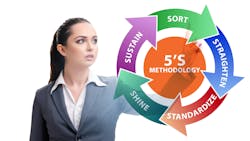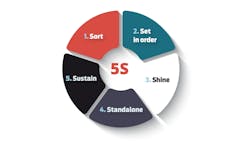Learning to lean: How a small California shop gets better every day
Not all shops have the time and resources to pull off large initiative, but they can still be lean.
Nina Ceja, operations manager at United Fleet Maintenance (UFM) in Woodland, California, expected some comebacks in the first few months when the shop opened in 2021. Having to rework jobs is one of the most egregious anti-lean events a shop can have, for it doubles the work, possibly parts, and hurts the relationship with the customer. So Ceja said UFM now has the most senior tech review the junior techs’ work (they have four techs total) having them explain their work step by step. It takes more time, Ceja admitted, but in the long run it prevents waste and protects the customer.
Though Ceja didn’t know it, UFM also naturally practices the 5S methodology of lean: Sort, Set in Order, Shine, Standardize, and Sustain. This really just means she makes sure the shop is clean and organized on a weekly basis.
A main reason is that the shop also services recreation vehicles, bringing in older customers.
“We have to keep the floors clean; we cannot have anybody trip over something,” she stressed.
Ceja also assigned the shop tech right out of school as the de facto lean enforcer.
“He is our main guy to ensure that everything is in its own place and understands why they're in that place,” Ceja said. It also feels like a good learning opportunity for him to get his hands on all the tools— by being the person who's responsible for making sure they stay in their spots.”
He’s also in charge of parts inventory, so he separates parts by various jobs, learning what brands are associated with which asset.
It’s sneakily brilliant, as the shop stays organized, allowing everyone to work more efficiently, while this one tech learns on the job.
Ceja, who admittedly doesn’t have a technical background, has found ways to optimize her own daily tasks by leveraging ChatGPT. UFM often submits bids to the California Department of General Services, and Ceja said creating the bids “used to take me a really long time because I would have to do the research myself for the parts and how long it would take.” If she couldn’t find the answer, she would ask a tech, taking time away from their productivity. Now she plugs questions into ChatGPT on parts’ price ranges and repair times, and gets answers in seconds. Ceja said she does fact check the answers, but the process narrows her search and keeps from being overcharged or spending hours calling vendors. Overall, she can create the service estimates in one day.
UFM, which uses Fullbay’s shop management platform, has also digitized service reports to ensure clearer communication and they use Airtable to automate scheduling.
See also: Latest repair industry stats from Fullbay
“Sometimes the ball would get dropped,” Ceja said, “and we would have [a customer’s asset] for about a week, and then realize, ‘Hey, why is this unit still here?’”
The software now reminds the techs to write the reports, using a template created by Ceja to streamline their writeups and make less technical.
“They were handwritten and techs didn’t always know the right terms to use,” Ceja said. “We take that report and we put it into an AI agent, which will then turn out a service report that anybody can read.”
About the Author

John Hitch
Editor-in-chief, Fleet Maintenance
John Hitch is the award-winning editor-in-chief of Fleet Maintenance, where his mission is to provide maintenance leaders and technicians with the the latest information on tools, strategies, and best practices to keep their fleets' commercial vehicles moving.
He is based out of Cleveland, Ohio, and has worked in the B2B journalism space for more than a decade. Hitch was previously senior editor for FleetOwner and before that was technology editor for IndustryWeek and and managing editor of New Equipment Digest.
Hitch graduated from Kent State University and was editor of the student magazine The Burr in 2009.
The former sonar technician served honorably aboard the fast-attack submarine USS Oklahoma City (SSN-723), where he participated in counter-drug ops, an under-ice expedition, and other missions he's not allowed to talk about for several more decades.

